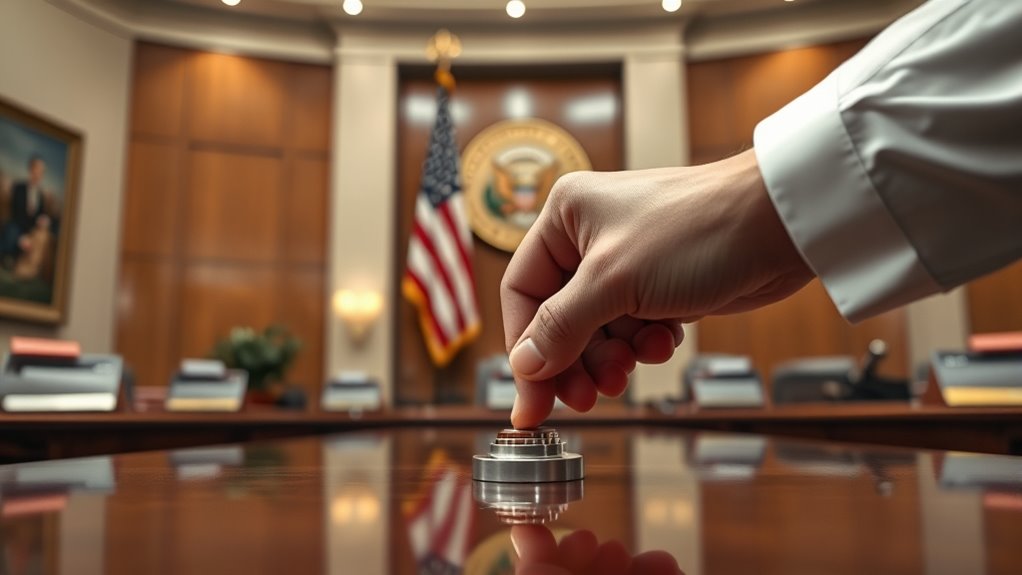President Trump’s executive order explicitly bans retail CBDCs in the U.S., signaling a strong move to protect your financial privacy and individual control over money. It aims to prevent the government from developing a digital currency that could be used for mass surveillance or loss of independence. This order reflects concerns about government overreach and emphasizes the importance of decentralized cryptocurrencies. If you want to understand how this impacts your digital financial freedoms, there’s more to explore.
Key Takeaways
- Former President Donald Trump signed an executive order banning retail CBDCs in the U.S. to prevent government-controlled digital currencies.
- The order aims to protect individual privacy and financial independence from potential government surveillance.
- It emphasizes promoting decentralized cryptocurrencies like Bitcoin and Ethereum over centralized CBDCs.
- The ban reflects skepticism toward government-led digital currencies, prioritizing personal rights and market freedom.
- The executive order signals a shift to limit government influence and encourage innovation in decentralized financial systems.

In a move that signals a clear stance on digital currency regulation, former President Donald Trump has signed an executive order banning retail Central Bank Digital Currencies (CBDCs). This decision sends a strong message about the government’s approach to controlling digital assets and protecting individual freedoms. If you’re involved in the cryptocurrency space or simply interested in digital financial systems, this move directly impacts your perception of financial sovereignty and the evolving landscape of cryptocurrency regulation.
By banning retail CBDCs, the executive order aims to prevent the government from developing a digital currency that could be used as a tool for mass surveillance or control. You might see this as a safeguard for personal privacy and financial independence, reinforcing the idea that your money should remain in your control without undue interference. This ban emphasizes the importance of maintaining the decentralized nature of cryptocurrencies, which are often praised for empowering users against centralized authority. It’s a clear message that the government prioritizes individual financial sovereignty over the convenience or perceived security of a government-issued digital currency.
Banning retail CBDCs protects privacy and promotes decentralized financial independence from government control.
The move reflects concerns that CBDCs could undermine the existing regulatory framework, potentially leading to increased government oversight of your transactions. If you value privacy and autonomy, you’ll likely view this executive order as a protective measure. It’s an assertion that cryptocurrencies, by design, offer a degree of freedom that CBDCs might threaten, especially if used to monitor or restrict financial activities. The order underscores the importance of a balanced approach to cryptocurrency regulation—one that fosters innovation without sacrificing personal rights.
You should also recognize that this executive order signals a broader skepticism toward the idea that a government-controlled digital currency can coexist with the principles of a free market. It suggests that the government may see CBDCs as a risk to financial sovereignty, potentially enabling greater control over your assets. As a result, you may feel more encouraged to explore decentralized cryptocurrencies like Bitcoin or Ethereum, which operate independently of government control. This ban could serve as a catalyst for strengthening the decentralized ecosystem, emphasizing that individual control over money remains a priority. Additionally, understanding the role of creative practice in fostering innovative thinking can help you adapt to rapid changes in digital finance and navigate new challenges with resilience.
Frequently Asked Questions
How Will This Order Impact Existing Digital Payment Systems?
This order limits retail CBDCs, which could slow financial innovation and impact your consumer trust in digital payments. You might notice fewer government-backed digital currency options, leading you to rely more on existing systems like credit cards or cryptocurrencies. While it preserves traditional payment methods, it could also hinder advancements that make transactions more secure and efficient, influencing how you experience digital payments moving forward.
Could This Ban Affect International Trade Agreements?
You might think the ban could disrupt international trade agreements, but it’s unlikely to have a major effect. While it signals a cautious stance on retail CBDCs, most trade deals focus on tariffs, regulations, and tariffs rather than digital currencies. However, the order could influence international implications by shaping how countries approach digital currencies, possibly leading to shifts in global financial cooperation or creating new hurdles for cross-border transactions.
Are There Any Exceptions for Government-Issued Digital Currencies?
You should know that there are generally no exceptions for government-issued digital currencies under this ban. The order aims to address privacy concerns and protect monetary sovereignty, so it restricts retail CBDCs to prevent potential misuse. While government-issued digital currencies might be exempt from this ban, the focus remains on ensuring individuals’ privacy isn’t compromised and maintaining the country’s control over its monetary system.
What Are the Potential Legal Challenges to This Executive Order?
You might face legal challenges to this executive order because banking regulations could be questioned, especially if they infringe on federal authority or violate existing financial laws. Legal enforcement could be contested if opponents argue it oversteps presidential powers or conflicts with other statutes. Courts might scrutinize whether the order appropriately balances regulatory oversight with individual rights, potentially leading to lawsuits that challenge its constitutionality or implementation.
How Might This Influence Future Developments in Digital Currency Regulation?
As regulations ripple and restrictions rise, your future in digital currency could face fierce federal frameworks. This order might mandate more meticulous monitoring, emphasizing central bank independence and consumer privacy, shaping stricter standards. You may see increased innovation within boundaries, balancing privacy protection and regulatory control. Ultimately, it could set a precedent, prompting policymakers to prioritize privacy while maintaining independence, influencing the trajectory of digital currency regulation for years to come.
Conclusion
By banning retail CBDCs, Trump’s executive order sends a powerful message that the future of money won’t be easily manipulated or controlled. You might think this is just a small step, but it’s really a giant leap toward preserving your financial freedom. If you value control over your own money, know that this order isn’t just a policy change—it’s a fortress, protecting your rights from an ever-encroaching digital drift.








